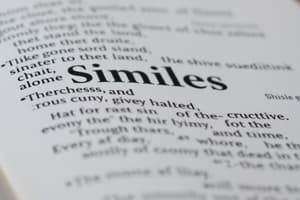Podcast
Questions and Answers
What is a simile?
What is a simile?
- An implicit comparison between two unlike things
- A figure of speech that exaggerates for effect
- A reference to history or literature
- An explicit comparison between two dissimilar things using 'like' or 'as' (correct)
What is a metaphor?
What is a metaphor?
A comparison between two unlike things without using 'like' or 'as'.
What is malapropism?
What is malapropism?
The mistaken use of a word in place of a similar-sounding one.
What defines a homophone?
What defines a homophone?
A pun is based upon what?
A pun is based upon what?
Explain personification.
Explain personification.
What is anthropomorphism?
What is anthropomorphism?
Define assonance.
Define assonance.
What is alliteration?
What is alliteration?
What does allusion refer to?
What does allusion refer to?
Explain connotation.
Explain connotation.
What does denotation mean?
What does denotation mean?
What is hyperbole?
What is hyperbole?
Define oxymoron.
Define oxymoron.
What is a rhetorical question?
What is a rhetorical question?
What is an archetype?
What is an archetype?
What is the first person narrative point of view?
What is the first person narrative point of view?
What is the second person narrative point of view?
What is the second person narrative point of view?
Explain the third person limited point of view.
Explain the third person limited point of view.
Define third person omniscient point of view.
Define third person omniscient point of view.
What is exposition in a story?
What is exposition in a story?
Define climax in a narrative.
Define climax in a narrative.
Flashcards are hidden until you start studying
Study Notes
Literary Terms and Their Definitions
- Simile: A direct comparison between two unlike things, using "like" or "as" (e.g., "Falling in love is like eating chocolate covered glass").
- Metaphor: A comparison between two unlike things without using "like" or "as" (e.g., "No man is an island" - John Donne).
- Malapropism: Incorrect usage of a word that sounds similar to the intended word, often resulting in humor (e.g., "dance a flamingo" instead of flamenco).
- Homophone: Words that sound the same but have different meanings, origins, or spellings (e.g., new vs. knew).
- Pun: A form of wordplay that exploits homophones for a humorous effect (e.g., waist/waste).
- Personification: Assigning human characteristics to abstract ideas or inanimate objects.
- Anthropomorphism: Giving animals or objects human traits or behaviors literally (e.g., cartoon characters like Bugs Bunny).
- Assonance: The repetition of vowel sounds within nearby words (e.g., sleep, deep).
- Alliteration: The repetition of consonant sounds, often at the beginning of words (e.g., sessions, sweet, silent).
- Allusion: An indirect reference to historical, literary, or cultural elements.
- Connotation: The emotional or associative meanings of a word beyond its literal definition (e.g., gold connoting wealth and beauty).
- Denotation: The exact, literal meaning of a word.
- Hyperbole: A deliberate exaggeration for the sake of emphasis (e.g., "I'm so hungry I could eat a horse").
- Oxymoron: A figure of speech that combines contradictory terms (e.g., jumbo shrimp).
- Rhetorical Question: A question posed to make a point rather than to elicit an answer; it asserts something rather than asks a question.
- Archetype: A recurring symbol, theme, or character type in literature that highlights universal aspects of human experience.
Narrative Perspectives
- First Person Point of View: A narrative told from the perspective of a character in the story, often featuring the pronoun "I"; can be subjective or unreliable.
- Second Person Point of View: A less common narrative style directly addressing the reader with "you."
- Third Person Limited Point of View: A narrative technique where the narrator knows only the thoughts and feelings of one character.
- Third Person Omniscient Point of View: A narrative perspective where an all-knowing narrator reveals the thoughts and feelings of all characters, remaining objective.
Story Structure Elements
- Exposition: Introduction of background information, including characters, setting, and the context for the main conflict.
- Climax: The most intense or exciting point in the story, often seen as a turning point that drives the plot forward.
Studying That Suits You
Use AI to generate personalized quizzes and flashcards to suit your learning preferences.




